![]()
![]()
![]()
![]()
![]()
![]()
jānnīke
fountain.
se jānnīke ēnne;
Here are two fountains.
Adelaide has all sorts of fountains, of which the most interesting is this one:
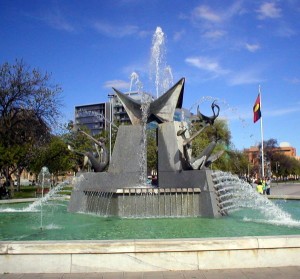
which symbolizes three rivers, the Murray, the Onkaparinga, and the Torrens.
Another fountain:
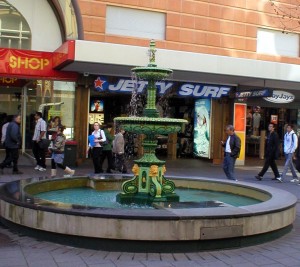
![]()
![]()
![]()
![]()
![]()
![]()
jānnīke
fountain.
se jānnīke ēnne;
Here are two fountains.
Adelaide has all sorts of fountains, of which the most interesting is this one:

which symbolizes three rivers, the Murray, the Onkaparinga, and the Torrens.
Another fountain:

![]()
![]()
![]()
![]()
![]()
![]()
janāola
Fire, flame.
pa janāola anxōλa;
Fire is pretty.
Apparently, at 6pm local time every evening, the pillars lining the river by the Crown entertainment complex emit flame. This happened while we were on the bridge crossing the river.
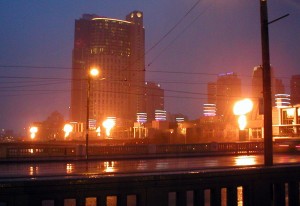
![]()
![]()
![]()
![]()
![]()
![]()
![]()
jasēlne
a sight, something to see.
sema jasēlni nā to jamāonre mo marēþa;
The city has many sights for the traveler.

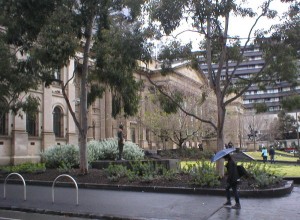
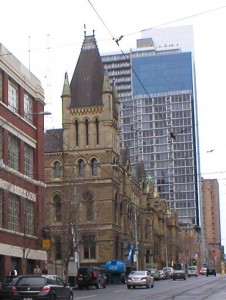
![]()
![]()
![]()
![]()
![]()
![]()
anciēri
courtesies, polite phrases and behaviors, and respect for another’s point of view. In other words, the right and proper way (anhēnār) to treat other people because they are people.
This is the fifth word in the third clause of the Kēlen rephrasal of the 1st article of the Universal Declaration of Human Rights. It sits next to the word anēla which is the stative form of mēla and thus means ‘personhood’.
Our progress:
tō la mēli manaren tēna ñe anhēnārīki anīλi jañāona jañēie
‘Because each person is an equal thread in the cloth of society…’
tō pa ñēim tēna ē lenārre ē lewēren
‘Because we each of us have soul and identity…’
tō jāo hēja senneñ anēla anciēri ke mān mo mīþa
ien sexe mo maþūskīri mo sāim maþūskīriēma cī;
![]()
![]()
![]()
![]()
![]()
anīλa
made of cloth.
This word is in the Kēlen rephrasal of the 1st article of the Universal Declaration of Human Rights due to a cultural metaphor of society as a piece of woven cloth. Originally, the metaphor included the idea of one’s kin in the clan being the up and down threads (the warp) and one’s paternal out-clan kin as being the side to side threads (the weft). A more modern interpretation has one’s kin as the warp and one’s other connections (colleagues, friends, acquaintances) as the weft. In the rephrasal, anīλa modifies anhēnārīki ‘society’, and is therefore in the collective. So, the phrase anhēnārīki anīλi refers to society as a piece of cloth, or ‘the cloth of society’.
Our progress:
tō la mēli manaren tēna ñe anhēnārīki anīλi jañāona jañēie
tō pa ñēim tēna ē lenārre ē lewēren
tō jāo hēja senneñ anēla anciēri ke mān mo mīþa
ien sexe mo maþūskīri mo sāim maþūskīriēma cī;
![]()
![]()
![]()
![]()
![]()
![]()
![]()
![]()
![]()
![]()
anhēnārīki
This word is derived from the stative noun anhēnār (‘right, good, proper, correct’) plus the suffix –īke (denotes an artificial construct). Together, the meaning has shifted a bit, and anhēnārīki means ‘society’. It’s a collective noun, and the suffix –īke means that it is something that people have made. It’s also the seventh word in the first clause of the Kēlen rephrasal of the 1st article of the Universal Declaration of Human Rights.
Our progress:
tō la mēli manaren tēna ñe anhēnārīki anīλi jañāona jañēie
tō pa ñēim tēna ē lenārre ē lewēren
tō jāo hēja senneñ anēla anciēri ke mān mo mīþa
ien sexe mo maþūskīri mo sāim maþūskīriēma cī;
![]()
![]()
![]()
![]()
![]()
![]()
![]()
![]()
jatēnnīke
a ceremony of joining.
ñi jatēnnīke ja pa jakīren riēnne;
You (two) are joined to the clan.
Note: OK, on to emotions and such next.
![]()
![]()
![]()
![]()
![]()
![]()
![]()
![]()
anhōhīke
1) the quality of having been deliberately prepared to be eaten; the quality of having been cooked.
2) the abstract concept of food preparation or cooking.
anhōhīke requires preparation, but it does not require subjecting something to heat. Ceviche (and I’m sure the Kēleni have something like ceviche, though I don’t know the word for it) would be anhōhīke, though not necessarily “cooked”.
[I have a few more food and cooking words, and then I thought I’d try a different subject. Any suggestions?]
![]()
![]()
![]()
![]()
![]()
![]()
![]()
![]()
jajūtīnne
a device for baking, an oven. In some areas this also qualifies as jakō.
![]()
![]()
![]()
![]()
jakō
the hearth, fireplace, or firepit that is the center of every personal dwelling.